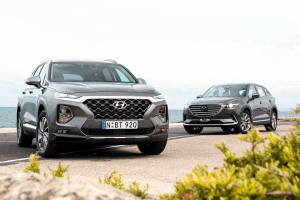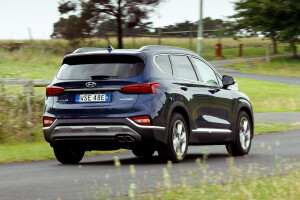The Hyundai Santa Fe is a popular large SUV featuring seven seats.
The current model, launched locally in 2021, is the fifth generation, and brought a level of technical sophistication, on-road refinement and overall premium feel the company had not previously achieved.
The Santa Fe range spans four trim grades each offered with the choice of 2.2-litre four-cylinder turbo-diesel power (driving all four wheels) or 3.5-litre V6 petrol engine, which drives the front wheels only.
The diesel engine is mated to an 8-speed dual-clutch transmission, rather than the eight-speed torque-convertor automatic used in the petrol variant.
Dimensionally the Santa Fe is only slightly smaller than the range-topping Palisade, so still delivers generous interior space.
An update for MY22 brought the addition of a front centre airbag, a multi-collision braking system (which applies the brakes after the airbag deploys to avoid a secondary collision) along with equipment upgrades to all models.
The large SUV category is home to the likes of the Toyota Kluger, so the Hyundai Santa Fe has strong opposition in terms of Australian brand knowledge, but provides opposition to the Mazda CX-9 and Mitsubishi Pajero Sport in terms of sales.
Current Hyundai Santa Fe Specs
| Version | Drivetrain | Fuel Type | Fuel (city) L/100km | Price |
|---|---|---|---|---|
| 3.5 MPi Auto | front | Petrol | 10.5L/100km | $46,050 |
| 2.2 CRDi DCT 4WD | 4x4 | Diesel | 6.1L/100km | $49,550 |
| 3.5 MPi Active Auto | front | Petrol | 10.5L/100km | $50,250 |
| 2.2 CRDi Active DCT 4WD | 4x4 | Diesel | 6.1L/100km | $53,750 |
| 3.5 MPi Elite Auto | front | Petrol | 10.5L/100km | $56,500 |
| 2.2 CRDi Elite DCT 4WD | 4x4 | Diesel | 6.1L/100km | $60,000 |
| 3.5 MPi Highlander Auto | front | Petrol | 10.5L/100km | $63,050 |
| 2.2 CRDi Highlander DCT 4WD | 4x4 | Diesel | 6.1L/100km | $66,550 |
Latest Review
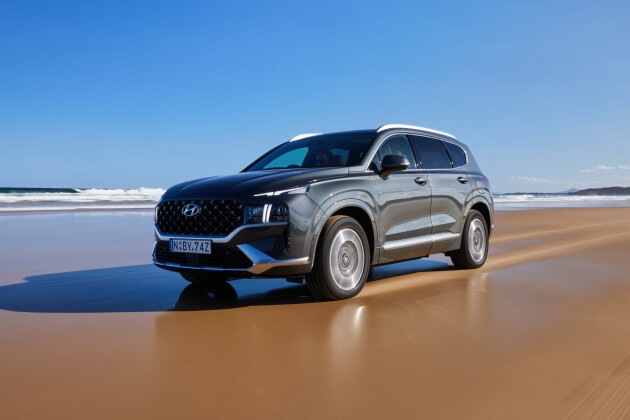
2023 Hyundai Santa Fe Hybrid review: First Australian drive
At long last, another seven-seat hybrid SUV hits Australia, this time in the shape of Hyundai's Santa Fe, but is there really room for another rival?
For a car enthusiast, driving a three-row hybrid SUV is about as exciting as Smooth FM’s fifth daily rotation of Phil Collins’ In The Air Tonight is to a Cannibal Corpse fan.
Except that, for the 2023 Hyundai Santa Fe hybrid’s Australian release, a seven-hour mixed-surface loop taking in mammoth potholes, corrugated dirt roads, a cow crossing and a rural model car shop was devised. It was a pretty epic drive.
Did it unearth how well the Santa Fe’s hybrid system works around town? In a way, yes. The hybrid powertrain’s refined urban operation was tested around Canberra and on the jaunt across Sydney to Hyundai’s Macquarie Park HQ.
But crucially, the route demonstrated that the Santa Fe’s first petrol all-wheel-drive powertrain is more than capable of withstanding Australia's rough conditions.
This is good news because if you wanted a petrol AWD three-row SUV – like 73 per cent of the market segment does – you would have needed to buy a Toyota Kluger. With the introduction of the hybrid Santa Fe, then, not only is there a more economical option from Korea, but Hyundai finally has a configuration demanded by the masses.
Under the bonnet of the Santa Fe hybrid is the same 169kW/350Nm powertrain as the Kia Sorento hybrid that hit Aussie shores in April. The hybrid Hyundai three-rower may have been delayed (and is unlikely to be sold with a PHEV option), but Hyundai’s supply levels are healthier with 400 Santa Fe hybrids on the ground right now, compared to Kia’s monthly allocation of 20 Sorento HEVs.
JUMP AHEAD
- How much is it, and what do you get?
- How do rivals compare on value?
- Interior comfort, space and storage
- What is it like to drive?
- How much fuel does it use?
- How safe is it?
- Warranty and running costs
- VERDICT
- Specifications
How much is it, and what do you get?
The Santa Fe hybrid range is two-strong, starting with the $63,000 Elite trim and headlined by the $69,550 Highlander (both before on-road costs).
A $3000 upcharge is commanded for the hybrid over an equivalent 2.2-litre turbo-diesel Santa Fe but unlike the oil burner, the petrol-electric combo isn’t available on all four grades.
Instead, the very complete mid-spec Elite is where things kick off. Elite features leather upholstery (tanned in your choice of black for free or Cognac for $295), a 12.3-inch digital driver’s display, electric seats with heating and more, as detailed below.
Above the Elite, the plush Highlander stands out with the $295 option of ‘Camel’ coloured Nappa cowhide, standard three-stage seat cooling, panoramic sunroof and – for the first time – availability of a six-seater arrangement with second-row captain’s chairs.
How do rivals compare on value?
Hyundai’s Santa Fe hybrid joins two other three-row petrol-electric SUVs in the Australian market, those being the Kia Sorento and Toyota Kluger that duked it out in a recent Wheels comparison test.
The Santa Fe is not the most affordable out there – that award goes to the cloth-upholstered Kluger GX hybrid ($54,150 before on-road costs) – but spec-for-spec, the Santa Fe shapes up well.
A range-topping 2023 Hyundai Santa Fe highlander AWD lists at $69,550 before on-road costs, $200 less than the equivalent Sorento GT-Line hybrid ($69,750) and $6150 cheaper than a Kluger Grande hybrid.
With the Elite understudy starting at $63,000 – which probably has enough spec for most – Santa Fe undercuts the Sorento GT-Line front-drive hybrid ($67,950) and the mid-spec Kluger GXL hybrid ($63,650). All before on-road costs.
Even compared to popular combustion-only rivals in the class, such as the Mazda CX-9 Azami LE turbo ($74,710) and larger Hyundai Palisade Highlander ($79,900) – both before on-road costs – the hybrid Hyundai stacks up smartly.
Interior comfort, space and storage
A light-coloured leather seems to effortlessly lift a cabin’s ambience. The Kia Sorento’s cabin may have a sleeker design than the Santa Fe’s but in Highlander trim with Camel upholstery and luxurious ventilated seats, Hyundai’s fairly affordable SUV feels a good deal more special than its list price.
Start looking around and this theme continues with that expansive glass roof, tactile suede-cloth headliner and soft-touch leather-appointed dashboard.
As you start to get over the initial wow factor, though, you notice the slightly messy-looking sea of buttons on the control-bridge-inspired centre console. I know, we complain endlessly about overly-minimal touchscreens, yet now we’re whingeing about too many buttons?
Some will surely appreciate the layout of the switches, but it is a touch bamboozling when you first get in. The button-controlled shifter takes time to wrap your head around, too.
The technology package is slick with attractive graphics rendered nicely on the Santa Fe’s 10.25-inch infotainment touchscreen. There’s navigation with live traffic and 10 years of updates plus DAB+ digital radio, as well as wired Apple CarPlay and Android Auto.
In front of the driver, there’s a 12.3-inch digital driver’s display on both Santa Fe hybrid trims, with graphics tied to the three drive modes: Eco, Smart and Sport.
Being appointed in soft Nappa leather with 14-way adjustment, heating and cooling the Santa Fe Highlander’s seats are a very comfy place to spend time. That said, even those in the Elite offer good adjustability including in-and-out lumbar support along with heating.
Bottle storage is good, with a comfy covered centre cubby and fairly decent door bins. There’s also a neat rubberised cubby ahead of the front passenger perfect for phones or notebooks. Hyundai’s vertical wireless smartphone charging is a really clever touch, further freeing up the centre console.
There’s one USB-A port for connectivity and another for charging, with a 12-volt socket located beneath the floating bridge where you’ll find further odds-and-ends storage with a rubberised floor to minimise slippage.
Jumping into the back seat and the three-wide bench is generous with lots of legroom and toe room. Headroom is generous, even under the Highlander’s panoramic sunroof.
The optional six-seat configuration with captain’s chairs, though, levels it up further. With individual adjustable armrests, power adjustment and space to stretch out, it’s an ultimate luxury conveyance for the kids.
There are other benefits beyond luxury, such as the ability to leave baby capsules set up in the outboard seats with a corridor through the middle for older kids to climb into the third row.
Third-row passengers will find an adequate amount of room. Like the Kia Sorento, the Hyundai Santa Fe is a well-packaged bit of kit and actually offers a more generous third row than the larger Toyota Kluger.
2023 Hyundai Santa Fe Hybrid boot space
Cargo space is generous too, with 130L available when all seats are in place, 571 litres with the second row in its furthest back position on the sliders, and up to 782 litres with the second row slid forward.
The finish quality is likewise classy, with the Highlander and Elite getting a removable carpet. There’s a little more storage under the floor, and all Santa Fe hybrids get a full-size spare wheel under the car as the 1.49kWh battery lives beneath the driver’s seat in the chassis.
What is it like to drive?
With the battery located towards the nose of the Santa Fe hybrid, Hyundai had to tweak the front suspension tune to suit. Unlike the core range, the hybrid Santa Fe’s suspension was not tuned in Australia, but it was signed off by local boffins before hitting dealers.
And it seems Hyundai global has been listening to Australian feedback about suspension tuning. The Santa Fe hybrid is smooth and plush, without being too wayward in its body control. It splits the difference between Kia Sorento GT-Line (firm) and Toyota Kluger Grande (supple).
Of the three selectable on-road drive modes, Smart cuts a nice balance as it responds to the driver’s inputs. Sport adds some welcome weight to the steering, which is fairly accurate for a vehicle of this type.
With only 176mm of ground clearance, the Santa Fe isn’t a rock crawler, but using Sand Terrain mode on the 60km of corrugated dirt road we encountered during the launch showed the Santa Fe’s ESC system to be smooth and proactive, with a neutral and predictable chassis balance.
The Santa Fe hybrid turns in well and its 235/55 R19 Continental Premium Contact tyres offer a good amount of grip. In its heaviest Highlander trim, the 1983kg hybrid adds 40kg of weight over the 2.2-litre turbo-diesel. While the Santa Fe typically deals with its weight well, there are no clever adaptive suspension tricks like you’d find in an Audi Q8 or BMW X7, so body roll wins out in the end.
It all results in a long-legged grand tourer that suits pockmarked Australian backroads and dirt corrugations as well as it does speed humps and concrete expansion joints.
This is also an extremely quiet seven-seater, more so than the alloy-block 148kW 2.2-litre four-cylinder diesel that typically thrums away in the background when driving an AWD Santa Fe.
Its ‘Smartstream’ 1.6-litre turbo-petrol four-cylinder is linked to a six-speed torque converter automatic with a 44.2kW/264Nm electric motor sandwiched in between, meaning the 2023 Santa Fe hybrid develops a combined 169kW of power and 350Nm of torque.
This means the Santa Fe hybrid gets an active on-demand AWD system – Hyundai calls it HTRAC – rather than a solution like Toyota’s eFour system with a separate electric motor and no physical connection to the engine at the front.
We found traction to be strong on both dirt and tarmac, where the Santa Fe hybrid sprinted from 0-100km/h in 8.7 seconds. There are occasions that the electric motor isn’t powerful enough to motivate the Santa Fe – mainly on steep car park ramps – but mostly the system is seamless and whisper quiet in its operation.
How much fuel does it use?
The Santa Fe hybrid AWD is rated at 6.0L/100km in the combined ADR 81/02 fuel economy cycle and will accept 91 RON or E10 blend unleaded at the bowser.
Although 40 per cent better than the V6 petrol (10.5L/100km), the hybrid is only a whisker more efficient than the diesel’s 6.1L/100km figure.
The hybrid’s equation for saving money on fuel doesn’t look great next to the 2.2-litre diesel, taking over 100,000kms to offset that 0.1L/100km saving, even when taking into account the current elevated price of diesel at the bowser.
On the 450km test loop that involved lots of technical, twisting country roads meaning that the petrol engine was doing the majority of the work, not the electric motor, the Santa Fe hybrid was showing 9.0L/100km on the trip computer.
In similar circumstances, the diesel Santa Fe would perform just as well, if not better (its ADR highway rating is 5.3L/100km) with the added benefit of 2500kg braked towing capacity over the Hybrid's 1650kg. So who exactly is the hybrid Santa Fe for then?
Returning from Canberra to Sydney, we found out. The Santa Fe hybrid’s consumption dropped to 6.0L/100km on the Federal and Hume highways, with a jaunt across Sydney’s inner west not affecting this fuel-sipping tendency.
It's in urban environments where families will reap the rewards of the Santa Fe hybrid, then. There are also fewer nasty particulate emissions when burning petrol compared to diesel.
How safe is it?
The Hyundai Santa Fe was awarded five stars in 2018 ANCAP safety testing.
Since its December 2020 facelift, the Santa Fe's safety list has improved further with the addition of junction auto emergency braking and a front centre airbag, bringing the total to seven. However, the Santa Fe's curtain airbags don't extend back to entirely cover third-row occupants.
Active safety features include forward AEB with pedestrian, cyclist and junction detection, low-speed reverse AEB, blind-spot monitoring, rear cross-traffic alert, rear occupant alert, driver monitoring, speed sign recognition and safe-exit assist.
Further driver aids include a conservative adaptive cruise control program with stop-and-go, somewhat jerky lane-trace assist, blind-spot view monitor (that handily beams a camera feed from the vehicle's flanks into the digital cluster), and front and rear parking sensors. The Highlander scores a 360-degree camera over the Elite.
Warranty and running costs
Hyundai covers the Santa Fe hybrid – as it does all models – with a five-year, unlimited-kilometre warranty in Australia. In addition, the high voltage electrics are warranted for eight years or 160,000km.
The five-year warranty matches most mainstream rivals, though Kia offers seven years with no kilometre cap, and Mitsubishi up to 10 years or 200,000km for its Outlander three-row SUV if serviced at a main dealer.
Santa Fe hybrid servicing is due every 12 months or 10,000km and Hyundai offers pre-paid service plans for up to five years or 50,000km. Servicing is anticipated to be a little dearer than the diesel ($2295), but Hyundai had not finalised hybrid service pricing at the time of writing.
VERDICT
The Hyundai Santa Fe may have come late to the three-row hybrid SUV party, but its arrival is welcome.
In the Highlander, Camel-tanned Nappa leather with cooled front seats is such a refreshing option in a sea of dark leather and piano black trim.
And while the Highlander may garner all the attention, the $63K Elite specification is bursting with gear – you don’t feel like you’re missing out by getting the cheaper one at all.
Country buyers will be better served by the diesel with its more impressive highway fuel consumption and mid-range torque but for urban dwellers, the Santa Fe hybrid is a refined, composed and efficient option that’s well worth considering.
2023 Hyundai Santa Fe Hybrid specifications
Score breakdown
Things we like
- Engine refinement
- Upholstery colour choices
- Excellent ride
Not so much
- Excessive buttons
- Highway efficiency
- Curtain airbags stop at second row
News
-
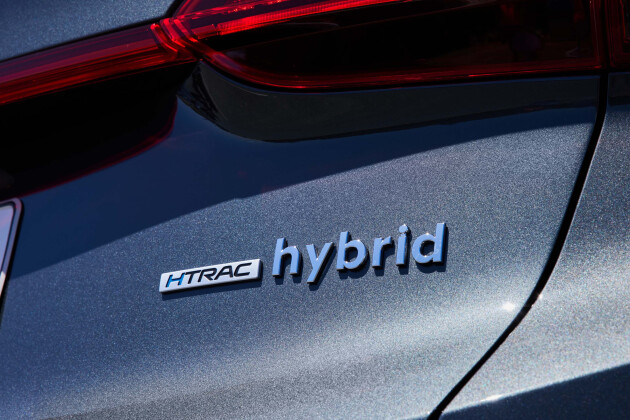 News
NewsNext-gen Santa Fe powertrains will be dictated by hybrid’s success; EV unlikely
At the launch of Hyundai’s first hybrid three-row SUV, executives commented that existing powertrains will determine the next model’s line-up in Australia
-
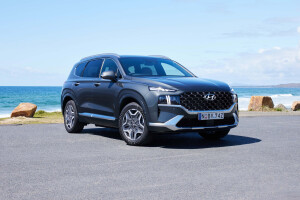 News
News2023 Hyundai Santa Fe Hybrid pricing and features
The hybrid Hyundai Santa Fe arrives in two flagship grades
-
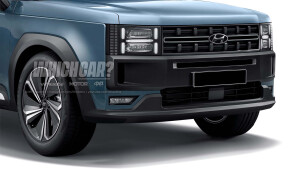 News
News2024 Hyundai Santa Fe spied and rendered with boxy new look
Hyundai's next-gen Santa Fe will continue the theme of shaking up the brand's styling language, introducing a boxy new American look
-
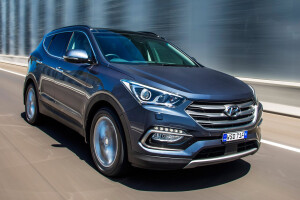 News
News2015-2017 Hyundai Santa Fe recalled due to fire risk
Almost 8800 Hyundai Santa Fes are being recalled in Australia due to an increased fire risk from a manufacturing defect
-
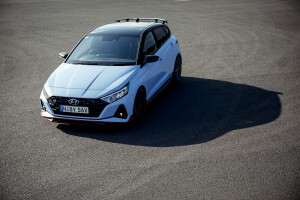
Hyundai increases prices across lineup
-
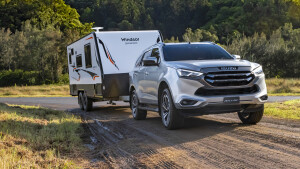
Towing: How much can my large SUV tow?
-
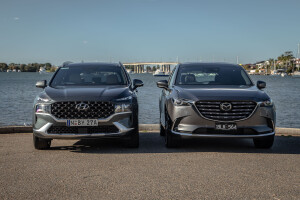
EOFY 2022: Best deals on medium and large SUVs
-
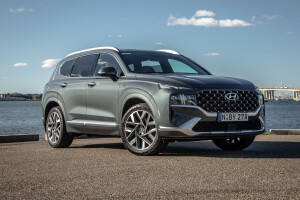
2021 Hyundai Santa Fe under recall
Frequently Asked Questions
The Santa Fe can tow up to 2000kg braked and has a 100kg tow ball weight.
Yes, a Hyundai Santa Fe is bigger than a Toyota RAV4 though the dimensions don't show too much of a difference. A Hyundai Santa Fe is 1.7m tall, 4.77m long, and 1.89m wide. The Toyota RAV4 is 1.69m tall, 4.62m long, and 1.86m wide. The Santa Fe also features third-row seating, where the RAV4 does not.
The Hyundai Santa Fe features an 8-speed automatic, which is a traditional torque converter rather than a continuously variable transmission (CVT).
This depends on the variant, for example, a base model active wears 17-inch wheels as standard and has 235/65 R17 sized tyres. A top-spec Highlander has bigger 19-inch wheels and 235/55 R19 tyres. If you're replacing your own Hyundai Santa Fe's tyres, you can check the sizing on the tyre wall.

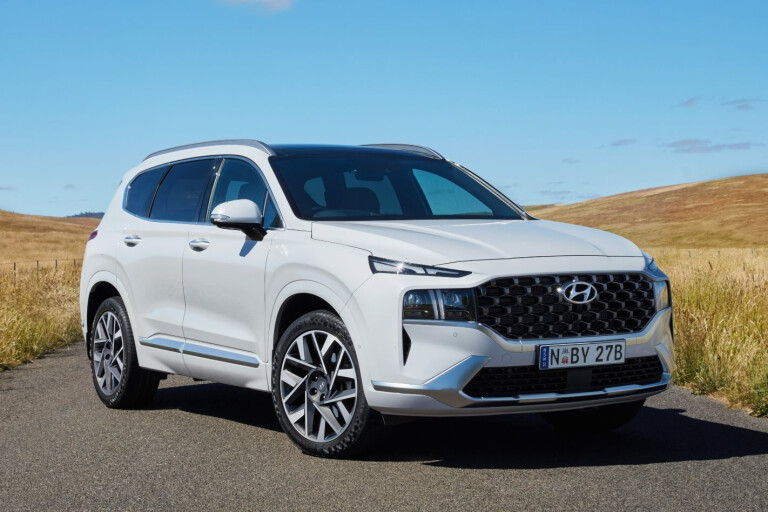

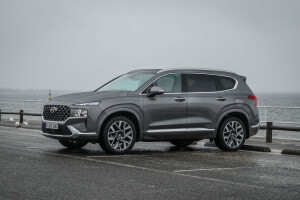
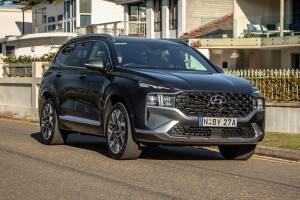
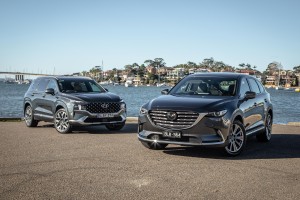
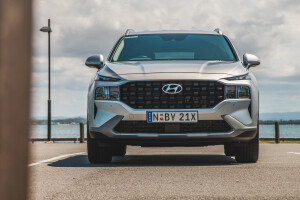
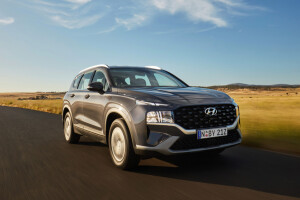
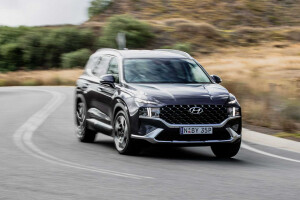

.jpg)
